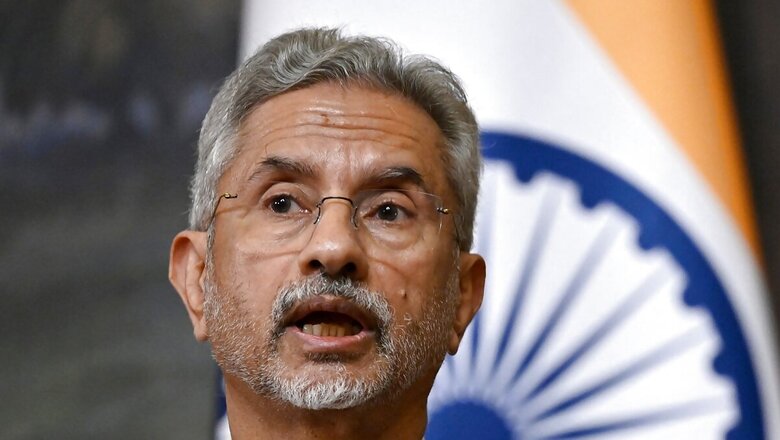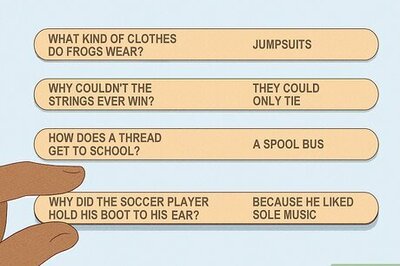
views
Even though this was a scheduled meeting and a routine summit that was given a skip by Prime Minister Narendra Modi, the timing was not lost on anyone. India’s Jaishankar, with his elaborate and highly publicised tour, did not hesitate to let the message reverberate in the US-led West— that India and Russia are always going to be friends, come what may.
And it garnered sharp reactions from Western commentators, proving that the message had landed where it was intended. Some reactions have been less kind and veered into the abyss of outright meltdowns against India and its foreign minister who was joined by Russian President Vladimir Putin to gush about soaring ties between the two nations.
A sense of indignation is at the heart of the discord — with the Western side tormented by the fact that India, almost two years since Putin’s invasion of Ukraine, would still not side with the West and jettison its decades-long bond with Russia, and the Indian side reeling from the USA and its allies’ controversial posturing on the Khalistani threat to India.
What the US Must Understand
There’s a reason why India liberally uses phrases like “time-tested” and “reliable partner” for Russia, terminology that would not be employed so generously for the United States.
Russia is not historically known for funding Pakistan’s military-terror nexus, nor is it known for threatening India against supporting the independence movement of Bangladesh, involving itself in Khalistani militancy or even making misplaced judgments about India’s treatment of minorities. Despite deep engagement between Washington and New Delhi across many dimensions today, a sense of mistrust and indignation plagues the relationship, especially in the media glare.
There is always something that becomes a sticking point in India’s ties with the US — hurdles that are made public time and again, that throw a monkey wrench into all the work done to advance India-US camaraderie. If it were not for the American liberal establishment’s sympathies for Khalistani terrorists, it would have been their veiled loyalties to Pakistan’s military rulers. If it were not for President Biden’s decision to turn down India’s invitation for Republic Day, it would be America’s bizarre enthusiasm to overthrow India-friendly Sheikh Hasina’s government in Bangladesh.
When Jaishankar says the India-Russia relationship is the only constant in world politics, he means it. “There was great care taken by the leaders, the governments, and the stakeholders of different types to actually nurture and look after this relationship,” he said in a speech in Russia. And the US should take the hint.
If India-US ties are to steer the course of this century to a substantial degree, then taking great care, no matter how uncharacteristic of the US, is of utmost necessity. For that, Washington’s elite will have to change their ways.
The Unhesitant Messaging
India and Russia are due every year for an annual summit of leaders. Substituting for PM Modi, who skipped visiting Moscow in 2022 as well, Jaishankar made a representation that should have theoretically been perceived as a step-down, but instead, it seemed to strike all the right chords.
The long schedule of meetings with Russian Foreign Minister Sergei Lavrov, Deputy Prime Minister Denis Manturov and President Putin himself reflect the depth of Jaishankar’s engagements and keenness of his delegation which was also seen in his address to Russian experts and academics and the Indian diaspora.
All of this was further amplified by the foreign minister’s social media activity — wherein he took the time to share a nostalgic titbit of his time in Russia as a seven-year-old in two pictures marking his long history of correspondence with Russia.
Jaishankar went on to stress the “importance of rebalancing and the emergence of multipolarity,” reasserting India’s independent foreign policy which is inclined towards a multipolar world order, and not the unipolar order that the US may wish to retain or even a bipolar one with China and Russia at the other end, which would split the world into two sides as in the cold war of the previous century. India recognises the need to rebalance decades-old ties with Russia amid deepening engagement with the West and the United States in particular.
Jaishankar deemed Russia as a “valued, time-tested partner” and stood unflinchingly next to Sergei Lavrov at a press conference as the Russian foreign minister criticised the West, and the US in particular for its many interventionist wars such as those in Libya, Iraq and Syria.
As it navigates around the strife between Russia and the West, India has consistently pursued its own interests. It refused to explicitly condemn Russia for the war in Ukraine, or support Western resolutions against Moscow at the UN. Going a step further, India spent billions on discounted Russian oil since the invasion in response to a global oil price crisis triggered by the West’s decision to shun Russian oil. In response to sanctions on international payments, Moscow and New Delhi agreed on a rupee-rouble payment system circumventing payments in the dollar altogether.
India-Russia trade now stands at nearly $50 billion, up significantly from $12 billion just two years ago. Discounted crude oil prices and payments in the rupee have benefitted both countries tremendously. India has largely beaten the heat of global inflationary conditions, and Russia has found a major alternative buyer in the third largest oil consumer.
Where India and Russia Really Stand
It must be noted that India-Russia relations were facing limited avenues for growth, including shrinking prospects for Russian defence imports, before the energy crisis of the two previous years opened up the opportunity for substantial oil trade, making Russia one of the biggest suppliers of crude oil to India. Now, economic ties between India and Russia are at their breakthrough point. It is under this backdrop that Jaishankar was visiting Moscow.
Talks between Moscow and New Delhi are now focused on increasing Indian exports to Russia to correct the lopsided trade balance. India wants Russia to redirect its inflating kitty of rupees towards Indian goods and services, boost Indian exports as a result and ultimately deepen the economic bond between the two nations instilling a relatively sustainable and permanent character.
In his meeting with Putin, Jaishankar made sure to point out the need to give this elevated trade dynamic a “more sustainable character”.
The massive growth in oil trade with India, in the midst of a war that has left Russia shunted by Western buyers, shows the leverage India has with Russia. Gone are the days when India was a junior partner to Russia. With an economy of nearly $4 trillion that has far outsized Russia’s $2.25 trillion, India has a lot more sway and has effectively raised the stakes as a complementary partner with rising interest and demand for natural resources that Russia happens to be abundantly rich in.
It is also both in India’s and Russia’s interest that Russia, while orbiting ever closer to it, does not slip entirely into China’s death grip. Moreover, obvious geopolitical realities leave a naturally powerful scope for Russia and India to thrive together. So, it makes complete sense to hold on to this exceptional relationship regardless of what overcharged commentators have to say. Meanwhile, there’s a subtle message in it for the US, and it can do with it as it pleases.



















Comments
0 comment